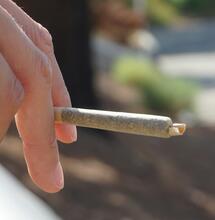Maine lawmakers propose 20 percent tax on recreational marijuana

Five percent of that would be paid to communities that host growing and retail operations.
[caption id="attachment_9200" align="alignnone" width="1000"] "A 20 percent tax rate is low enough to compete with the illicit market, and it keeps us competitive with Massachusetts," said David Boyer of Maine Marijuana Policy Project, shown in November. Photo by Ben McCanna[/caption]
Recreational marijuana would be taxed at 20 percent, with 5 percent of that paid to communities that host growing or retail facilities, under a plan proposed Tuesday by a committee drawing up regulations for the new industry.
Lawmakers proposed a 10 percent wholesale tax, or excise tax, and a 10 percent sales tax on recreational marijuana – the same overall tax rate as Massachusetts – during an 8-hour session Tuesday. The marijuana legalization committee proposed having the state distribute 5 percent of all state taxes collected from cultivation or retail operations to host communities.
In Maine, this tax scheme would drive the price of marijuana up from an average of about $200 an ounce to about $240, with a $20 excise tax levied on the cultivator, which would be built into the price, and a $20 sales tax charged to consumers at the time of purchase. Host communities would get $2 of that $40, with the rest going to the state.
That is double the tax that Maine voters approved when they passed the recreational marijuana ballot question last November. The act authorizes the state to levy a 10 percent sales tax, but there is no mention of an excise tax. There is also no mention of earmarking any of that tax revenue for towns, although legalization advocates Tuesday applauded that idea and were ready to support the 20 percent total.
“A 20 percent tax rate is low enough to compete with the illicit market, and it keeps us competitive with Massachusetts,” said David Boyer of Maine Marijuana Policy Project. “Municipalities should get a share of the tax revenue that comes with regulating legal marijuana businesses.”
"A 20 percent tax rate is low enough to compete with the illicit market, and it keeps us competitive with Massachusetts," said David Boyer of Maine Marijuana Policy Project, shown in November. Photo by Ben McCanna[/caption]
Recreational marijuana would be taxed at 20 percent, with 5 percent of that paid to communities that host growing or retail facilities, under a plan proposed Tuesday by a committee drawing up regulations for the new industry.
Lawmakers proposed a 10 percent wholesale tax, or excise tax, and a 10 percent sales tax on recreational marijuana – the same overall tax rate as Massachusetts – during an 8-hour session Tuesday. The marijuana legalization committee proposed having the state distribute 5 percent of all state taxes collected from cultivation or retail operations to host communities.
In Maine, this tax scheme would drive the price of marijuana up from an average of about $200 an ounce to about $240, with a $20 excise tax levied on the cultivator, which would be built into the price, and a $20 sales tax charged to consumers at the time of purchase. Host communities would get $2 of that $40, with the rest going to the state.
That is double the tax that Maine voters approved when they passed the recreational marijuana ballot question last November. The act authorizes the state to levy a 10 percent sales tax, but there is no mention of an excise tax. There is also no mention of earmarking any of that tax revenue for towns, although legalization advocates Tuesday applauded that idea and were ready to support the 20 percent total.
“A 20 percent tax rate is low enough to compete with the illicit market, and it keeps us competitive with Massachusetts,” said David Boyer of Maine Marijuana Policy Project. “Municipalities should get a share of the tax revenue that comes with regulating legal marijuana businesses.”
MAINE COULD REAP $18 MILLION YEARLY
At the time of the referendum vote on legalization, state analysts projected Maine would collect about $10.5 million from a 10 percent marijuana sales tax in 2018-19. But James Myall, a policy analyst for the Maine Center for Economic Policy, believes Maine could bring in about $18 million a year from a 10 percent tax once the market is established, in two or three years. With a 20 percent overall tax, recreational cannabis could generate at least $21 million in its first full year of operation, plus at least another $1.5 million from medical marijuana dispensary sales. That doesn’t include what 3,200 medical marijuana caregivers pay in sales or prepared food taxes, which is collected by the state but isn’t tracked as a group. The new proposal doesn’t change the medical marijuana tax rate, which would remain at 5.5 percent for retail sales and 8 percent for edibles. Some committee members wanted to tax recreational and medical marijuana at the same rate, to avoid people gaming the medical system to avoid paying the higher tax, but caregivers wanted to retain a tax advantage to keep the medical marijuana industry alive. Some members of the committee wanted a higher tax. Rep. Lydia C. Blume, a York Democrat, urged her committee colleagues not to leave money on the table. But Rep. Kent Ackley of Monmouth, a Common Sense Independent, was among those who wanted to tax recreational marijuana at the same rate as medical to keep things simple and keep taxes low enough to stifle the state’s black market pot sales. The committee had hoped to decide Tuesday what to include in an omnibus regulatory bill that would go the full Legislature for consideration at a one-day special session this fall, but there are still several issues to decide, including licensing fees. The chairmen of the joint committee have also asked state analysts to come back with more details about how to levy the excise tax.The committee is set to reconvene on Aug. 4 to continue work on the regulations.
EXCISE TAX MAY BE BASED ON VOLUME
They want an excise tax that would be equal to a 10 percent wholesale tax, but they want the tax figured on volume of product sold rather than price. That would help keep the revenue stream stable after the price of wholesale marijuana drops, which is what has happened in other states that have legalized recreational marijuana once the market is established. Each of the seven other states that have legalized recreational marijuana approach taxes differently. Massachusetts just set a maximum 20 percent tax for its upcoming recreational market, including a 3 percent local tax. Voters had wanted to set a maximum 12 percent tax rate – a 6.25 percent sales tax, a 3.75 percent excise tax and a 2 percent local tax. That state wants to complete regulations by March and have a licensing system in place for retail stores to open next July. In Colorado, the first state to legalize recreational cannabis, consumers pay a 10 percent marijuana sales tax, a 2.9 percent general sales tax and some communities levy a local sales tax, which is 3.5 percent in Denver. Marijuana wholesalers pay different taxes on different parts of the plant – higher rates for buds, lower rates for trim – that averages out to be a 15 percent excise tax. Medical marijuana is taxed at 2.9 percent. States with legalized marijuana are expected to generate approximately $655 million in state taxes on retail sales in 2017, according to New Frontier Data, a cannabis industry reporting firm.By 2020, New Frontier predicts Maine’s combined total medical marijuana and recreational sales will be $321.4 million.
SOURCE Save
S
Soft Secrets



